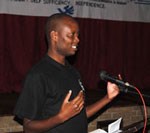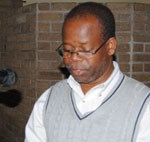Media practitioners in Malawi have bemoaned what they described as lack of support from non-governmental organisations whenever journalists are experiencing oppression and persecution.

Thom Khanje.
This was expressed on Friday by Thom Khanje, vice-chairperson of the Malawi chapter of the Media Institute of Southern Africa (MISA-Malawi), during the commencement of this year's commemoration of the World Press Freedom Day.
"During the police raid on the media in July last year, no NGO came forward to condemn the barbaric act of the police on the media," he said. Malawi's Bloomberg correspondent Frank Jomo agreed with Khanje: "We as the media help human rights NGOs advance their cause. It is disheartening they [NGOs] remained silent when government passed Section 46 of the constitution aimed at muzzling press freedom in the country and yet we are always on the ground exposing all the oppression," said Jomo.
Before his opening remarks at the Blantyre event, Khanje asked media practitioners who had gathered for the function to observe a minute silence in honour of the soul of President Bingu Wa Mutharika who died on 5 April 2012 and was laid to rest on Monday, 23 April 2012.
The event removed the annual march in the city streets as an honour to Mutharika and only engaged in a debate that was focusing on Media Freedom and Freedom of Expression: The Role of Human Rights Defenders in Promoting the rule of Law and Constitutionalism in Malawi.
Aiming to give people an opportunity to assess the media landscape in Malawi
Khanje said the debate which brought together human rights defenders from civil society, academia, media and government helped to take stock of what they have done in promoting constitutionalism in the country and what could be done to address the gaps if any.
"The aim of the debate was to give people an opportunity to assess the media landscape and human rights situation in Malawi," he said.
The debate revolved around the role of human rights defenders in safeguarding the country's democracy and human rights, specifically media freedom and freedom of expression. It also dwelt the current status of human rights in the country where it tried to establish if citizens are free to express themselves or whether civil society organisations done enough in promoting rule of law and Constitutionalism in Malawi.
Khanje said the debate was meant to discuss and possibly find solutions to the challenges the country is facing, if any and exploring areas the country has done well in terms of its human rights record.
The National Commission for UNESCO in Malawi funded the event.
"UNESCO provide to the media, not only during World Press Freedom Day celebrations, but in areas of research and capacity building for the media," said Khanje adding that MISA-Malawi will always remain indebted to UNESCO for this consistent and sustained support.
Freedom of expression a precious right

Emmanuel Kondowe.
Taking his turn, Emmanuel Kondowe acting deputy executive secretary for the Malawi National Commission for UNESCO said freedom of expression, from where press freedom is derived, is one of humanity's most precious rights.
"It underpins every other freedom and provides a foundation for human dignity. Free, pluralistic and independent media is essential for its exercise," said Kondowe.
He said media freedom entails the freedom to hold opinions and to seek, receive and impart information and ideas through any media and regardless of frontiers, as stated in Article 19 of the Universal Declaration of Human Rights and that this freedom is essential for healthy and vibrant societies.
"Change in the Arab world has shown the power of aspirations for rights when combined with new and old media. Here in Malawi the independent media has, since 1992, been in the forefront of promoting and defending the aspirations of Malawians through the impartial and professional coverage of events in the country," explained Kondowe.
Events in the recent past, he added, have served to emphasise the importance of giving Malawians true, unbiased and accurate information.
"This is only possible in an atmosphere where the media is free, pluralistic and independent," he declared.
Kondowe said that like elsewhere in the world, newfound media freedom is promising to transform the Malawian society through transparency and greater accountability.
"It is opening up new ways to communicate and to share information and knowledge."
Concerns remain
He however said as UNESCO they are still concerned that the media freedom is under constant threat.
"Again events in our recent past attest to this. Journalists have been attacked by their fellow citizens and not least by some sectors of society who are charged with protecting the sanctity of life including the lives of journalists," said Kondowe referring to beating up of journalists last year and continued harassment that journalists experience from those in authority.
Kondowe told the gathering that the first UN Inter-Agency Meeting on Safety of Journalists and the Issue of impunity met at UNESCO in 2011 and produced a Plan of Action for the UN to build a freer and safer environment for journalists and media workers everywhere, and Malawi could take advantage of it.
MISA-Malawi is this year celebrating World Press Freedom Day (WPFD) in all the three regions of the country and the main function will be held in Lilongwe on Saturday, 5 May.
The celebrations this year are being held under the theme New Voices: Media Freedom and Social Change. Khanje said this year's theme aims to cast the spotlight on the importance of new media and media freedom in promoting change and national development.
After the Blantyre, debate on Friday another debate followed in the northern city of Mzuzu. It focused on New media and Social Change: Opportunities and Challenges for Malawi, and was funded by the Public Affairs Section of the United States Embassy.
The main Lilongwe event will include a freedom march, football and netball games, gala dinner, media awards and debate on New media and National Development: Opportunities and Challenges for Malawi. This debate will be made possible with funding from the German Embassy.
Khanje said MISA-Malawi would take advantage of the event to appeal to all human rights defenders to safeguard the rule of law and constitutionalism News 30 April vigilantly by speaking out and exposing any wrong doings in society.
"Let us not forget our role of being watchdogs over society. It is our duty to safeguard our democracy," he said.




























